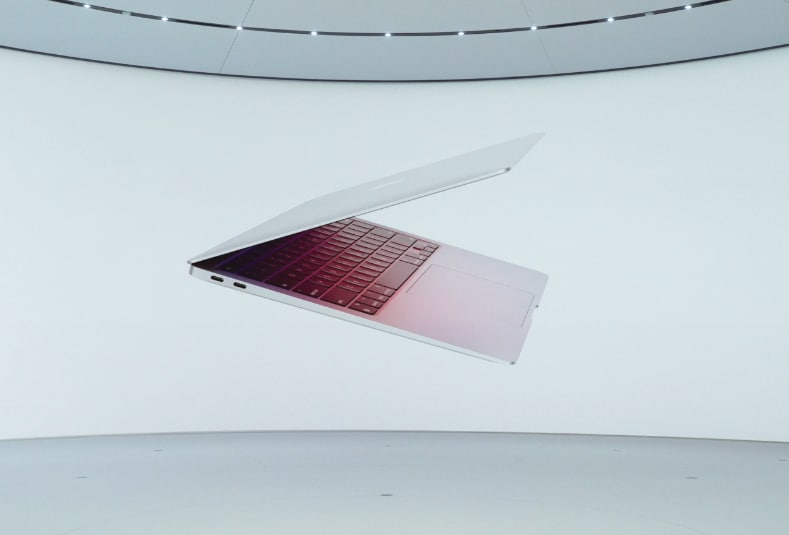D
Size: a a a
2020 November 10
R(
девайс прикольный на тот момент был, поигрался пару месяцев и продал дороже номинала
А в чём именно его прикольность, интересно?
D
А в чём именно его прикольность, интересно?
что в такой мелкой железке столько возможностей. опять-таки у нас табло на остановках на малине, например
R(

Apple представила первый компьютер Mac на собственном процессоре M1 - им стал новый MacBook Air
Apple уже представляла свои компьютеры Мак на своём процессоре PowerPC. Я почти застал конец линейки.
Опять понесло в оригинальничанье? Нуууууууу, удача им понадобится.
Опять понесло в оригинальничанье? Нуууууууу, удача им понадобится.
R(
Я не переживаю, скорее наборот. :) Большому кораблю большая торпеда. Apple начинает пытаться повторить "успех" Microsoft с Windows RT.
Ню-ню.
Ню-ню.
P
Apple уже представляла свои компьютеры Мак на своём процессоре PowerPC. Я почти застал конец линейки.
Опять понесло в оригинальничанье? Нуууууууу, удача им понадобится.
Опять понесло в оригинальничанье? Нуууууууу, удача им понадобится.
и чем они были плохи?
S
так-то про АРМ Маки уже давно была инфа
S
я вам больше скажу, интела тоже перейдут
R(
и чем они были плохи?
Не могу сказать, не застал.
Если я правильно понимаю эту тему, под отдельный процессор надо накручивать отдельные ассемблеры, компиляторы, и приложения.
Как оно случилось с Windows RT, вендоры могут решить не заморачиваться на это.
Windows RT was released to mixed reviews from various outlets and critics. Some felt that Windows RT devices had advantages over other mobile platforms (such as iOS or Android) because of its bundled software and the ability to use a wider variety of USB peripherals and accessories, but the platform was criticized for its poor software ecosystem, citing the early stage of Windows Store and its incompatibility with existing Windows software, and other limitations over Windows 8.
Critics and analysts deemed Windows RT to be commercially unsuccessful, citing these limitations, its unclear, uncompetitive position of sitting as an underpowered system between Windows Phone and Windows 8, and the introduction of Windows 8 devices with battery life and functionality that met or exceeded that of Windows RT devices. Improvements to Intel's mobile processors, along with a decision by Microsoft to remove OEM license fees for Windows on devices with screens smaller than 9 inches, spurred a market for low-end Wintel tablets running the full Windows 8 platform. These devices largely cannibalized Windows RT; vendors began phasing out their Windows RT devices due to poor sales, and less than a year after its release, Microsoft suffered a US$900 million loss that was largely blamed on poor sales of the ARM-based Surface tablet and unsold stock.
Если я правильно понимаю эту тему, под отдельный процессор надо накручивать отдельные ассемблеры, компиляторы, и приложения.
Как оно случилось с Windows RT, вендоры могут решить не заморачиваться на это.
Windows RT was released to mixed reviews from various outlets and critics. Some felt that Windows RT devices had advantages over other mobile platforms (such as iOS or Android) because of its bundled software and the ability to use a wider variety of USB peripherals and accessories, but the platform was criticized for its poor software ecosystem, citing the early stage of Windows Store and its incompatibility with existing Windows software, and other limitations over Windows 8.
Critics and analysts deemed Windows RT to be commercially unsuccessful, citing these limitations, its unclear, uncompetitive position of sitting as an underpowered system between Windows Phone and Windows 8, and the introduction of Windows 8 devices with battery life and functionality that met or exceeded that of Windows RT devices. Improvements to Intel's mobile processors, along with a decision by Microsoft to remove OEM license fees for Windows on devices with screens smaller than 9 inches, spurred a market for low-end Wintel tablets running the full Windows 8 platform. These devices largely cannibalized Windows RT; vendors began phasing out their Windows RT devices due to poor sales, and less than a year after its release, Microsoft suffered a US$900 million loss that was largely blamed on poor sales of the ARM-based Surface tablet and unsold stock.
P
В этой теме было примерно так: всякие приложения вертелись на повере быстрее, чем аналогичные на х86 сходных конфигураций, назовем так условно. Да тот же Фотошоп. И писали их под повер тщательнее, потому что основная масса пользователей (плативших деньги) сидела на этих самых поверах.
R(
В этой теме было примерно так: всякие приложения вертелись на повере быстрее, чем аналогичные на х86 сходных конфигураций, назовем так условно. Да тот же Фотошоп. И писали их под повер тщательнее, потому что основная масса пользователей (плативших деньги) сидела на этих самых поверах.
Нет, пожалуйста-пожалуйста, вполне возможно что пользователям фотошопа зайдёт -- но как оно будет поддерживать всё остальное, и захотят ли всякие-разные вендоры под него заморачиваться?
S
см. мой коммент выше))
R(
Sub
см. мой коммент выше))
И что там такого?
S
арм архитектура для десктопов в ближайшие годы станет массовым явлением, яблоки просто первыми запустились. Так что да, будут и компиляторы, и софт и заморочки



